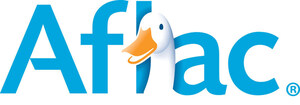Aflac study reveals enduring stress and anxiety are affecting U.S. workforce mental health and productivity
COLUMBUS, Ga., Nov. 16, 2022 /PRNewswire/ -- Due to continued COVID-19 concerns, a sluggish economy and the fear of a potential recession, there is a critical need for mental health care and resources to support employees, according to the nationally representative 12th annual Aflac WorkForces Report. The study — released by Aflac Incorporated, a leading provider of supplemental health insurance and products in the U.S. — captures trends and attitudes about the state of workplace benefits.
According to the newly released report, more than half (59%) of American workers are experiencing at least moderate levels of burnout, a notable increase over 2021 (52%) and on par with the levels reported in 2020 at the height of the COVID-19 pandemic, according to the 2022-2023 Aflac WorkForces Report.
Mental health and well-being rise to the top
The study uncovers the enduring effect of stress and uncertainty on Americans, making mental health care a big priority for employers. Stress is not only impacting American workers' home lives, but also their work lives and, consequently, productivity. The survey found that employees are asking for mental health care in higher numbers than ever before, and employers are searching for new ways to provide it. Key statistics:
- Mental health negatively affected job performances of nearly half (46%) of the U.S. workforce in the past year — a significant increase over 2021 (34%).
- More than half (51%) of employers recognize that employee mental health issues have affected their businesses over the past year.
- Nearly 80% of employees state that mental health coverage is critical, yet only 61% have access to mental health care as part of their benefits package.
Burnout has a detrimental impact on U.S. workforce
Survey responses show that burnout is associated with job satisfaction and loyalty. Employees who suffer from high levels of burnout report lower job satisfaction (55%), lower confidence that their employers care about them (47%), negative perceptions of work-life balance (55%) and a higher likelihood of seeking another job in the next year (56%). According to the report:
- The most financially concerned populations — Gen Z (71%), those working multiple jobs (66%), Hispanics (65%), those working multiple jobs (66%), millennials (65%) and women (62%) — are seriously affected by burnout.
- Yet 45% of employers are no more likely this year than last (43%) to view burnout as a problem for their organization.
- Over half (56%) of employees believe that their organizations care about their well-being at least a moderate amount. This sentiment is strongest among those with a hybrid working arrangement (70%).
"A major concern of employee burnout is the impact on their well-being and how it affects engagement and retention," said Matthew Owenby, chief human resources officer, Aflac Incorporated. "Employers are looking for new ways to offer benefits that help improve their employees' mental health balance. At Aflac, we help support our customers with access to mental health benefits, which is available through our individual short–term disability and group critical illness products."2
Employees and employers have differing views on financial stability
According to the survey, many American workers are struggling financially, and even more are vulnerable to unexpected medical costs not covered by health insurance. While employers have always lagged in understanding the financial instability facing the workforce, this year, the gap is wider than ever.
- More than half (58%) of Americans say they could not pay $1,000 in out-of-pocket costs. This is most concerning for Gen Z (78%), African Americans (72%) and Hispanics (65%).
- About 3 out of 5 (57%) workers report suffering high levels of anxiety about health care costs exceeding what their insurance covers. This is most prevalent among Hispanics (69%), including both Gen Z and millennials (65%).
- Three-quarters (76%) of employers think their employees understand their health care costs well, while just 52% of employees agree.
- About 57% of employees are confident they will be very well covered in the event of a serious illness, and only 1 in 5 believe they will be covered extremely well.
- Hispanic (46%) — including both Gen Z and millennial (44%) — workers are the most impacted by inflation with nearly half indicating that rising costs have affected their ability to afford a medical treatment or prescription.
"Soaring health care costs, lack of understanding of benefits on health insurance policies and the economic downturn have contributed to employees' anxiety about their insurance coverage," said Owenby. "Hispanics and younger workers have been hard-hit by inflation with nearly half indicating that rising costs have driven them to choose between paying medical or other bills."
Supplemental insurance can help provide an additional layer of financial protection
- About half (48%) of American employees view supplemental benefits as a core component of a comprehensive benefits program.
- Nine out of 10 employees believe the need for supplemental insurance like dental, life and vision is increasing.
- Nearly 77% of employers who offer supplemental insurance believe these benefits help with recruitment, and 80% say they help with retention.
The COVID-19 pandemic brought about sweeping changes to the workplace, the workforce, and benefits enrollment and management, while also spurring a period of innovation in the benefits space. However, even with advancements in key areas such a telemedicine and other online resources, employees made it clear in 2022 that they value the human side of their benefits packages just as much. Offering robust mental health resources, flexible work schedules, and one-on-one support rise to the top this year as ways for employers to attract and retain top talent in today's competitive work environment.
To learn more, read the 2022-2023 Aflac WorkForces Report at AflacWorkForcesReport.com.
About the 2022-2023 Aflac WorkForces Report
The 2022-2023 Aflac WorkForces Report, conducted by Kantar on behalf of Aflac, is the 12th annual study examining benefits trends, attitudes and use of employee benefits in the U.S. workforce in various industries and business sizes. The employer survey took place online between Aug. 31, 2022, and Sept. 20, 2022, and captured responses from 1,200 employers. The online employee survey captured responses from 2,001 employees between Aug. 31, 2022, and Sept. 20, 2022. Throughout this report, some percentages may not add up to 100% due to rounding of some responses.
About Aflac Incorporated
Aflac Incorporated (NYSE: AFL) is a Fortune 500 company helping provide protection to more than 50 million people through its subsidiaries in Japan and the U.S., paying cash fast when policyholders get sick or injured. For more than six decades, the insurance policies of Aflac Incorporated's subsidiaries have given policyholders the opportunity to focus on recovery, not financial stress. In the U.S., Aflac is the number one provider of supplemental health insurance products.1 Aflac Life Insurance Japan is the leading provider of medical and cancer insurance in Japan, where it insures 1 in 4 households. In 2021, the company was included in the Dow Jones Sustainability North America Index and became a signatory of the Principles for Responsible Investment (PRI). In 2022, Aflac Incorporated was proud to be included as one of the World's Most Ethical Companies by Ethisphere for the 16th consecutive year, Fortune's World's Most Admired Companies for the 21st time and Bloomberg's Gender-Equality Index for the third consecutive year. To find out how to get help with expenses health insurance doesn't cover, get to know us at aflac.com or aflac.com/español. Investors may learn more about Aflac Incorporated and its commitment to ESG and social responsibility at investors.aflac.com under "Sustainability."
Media contact – Jon A. Sullivan, 706.763.4813 or [email protected]
Analyst and investor contact – David A. Young, 706.596.3264, 800.235.2667 or [email protected]
1 LIMRA 2021 US Supplemental Health Insurance Total Market Report
2 Mental health benefits may not be available in all states, including but not limited to ID, NJ, NM, NY, or VA. Individual short–term disability policies: In Idaho, Policy A57600IDR. In Oklahoma, Policies A57600OK & A57600LBOK. In Virginia, Policies A57600VA & A57600LBVA. Refer to the exact plans and riders for benefit details, definitions, limitations and exclusions. Plans and riders may also contain a waiting period. For availability and costs, please contact your local Aflac agent/producer. Individual coverage is underwritten by Aflac. In New York, individual coverage is underwritten by Aflac New York. Group coverage is underwritten by Continental American Insurance Company (CAIC), wholly-owned subsidiary of Aflac Incorporated. CAIC is not licensed to solicit business in New York, Guam, Puerto Rico, or the Virgin Islands. For groups sitused in California, coverage is underwritten by Continental American Life Insurance Company. For groups sitused in New York, group coverage is underwritten by Aflac New York. Continental American Insurance Company | Columbia, SC.
SOURCE Aflac

WANT YOUR COMPANY'S NEWS FEATURED ON PRNEWSWIRE.COM?
Newsrooms &
Influencers
Digital Media
Outlets
Journalists
Opted In






Share this article